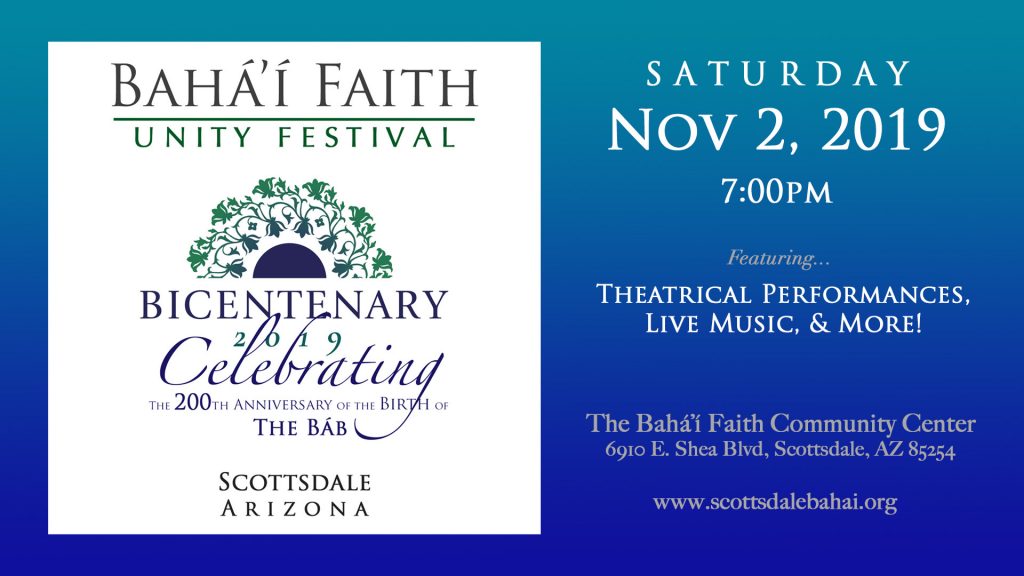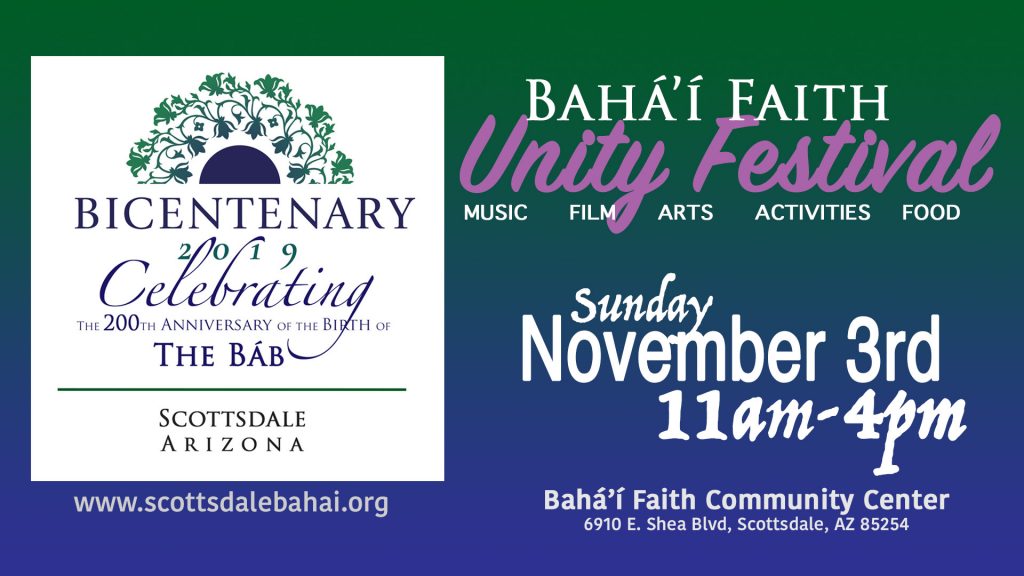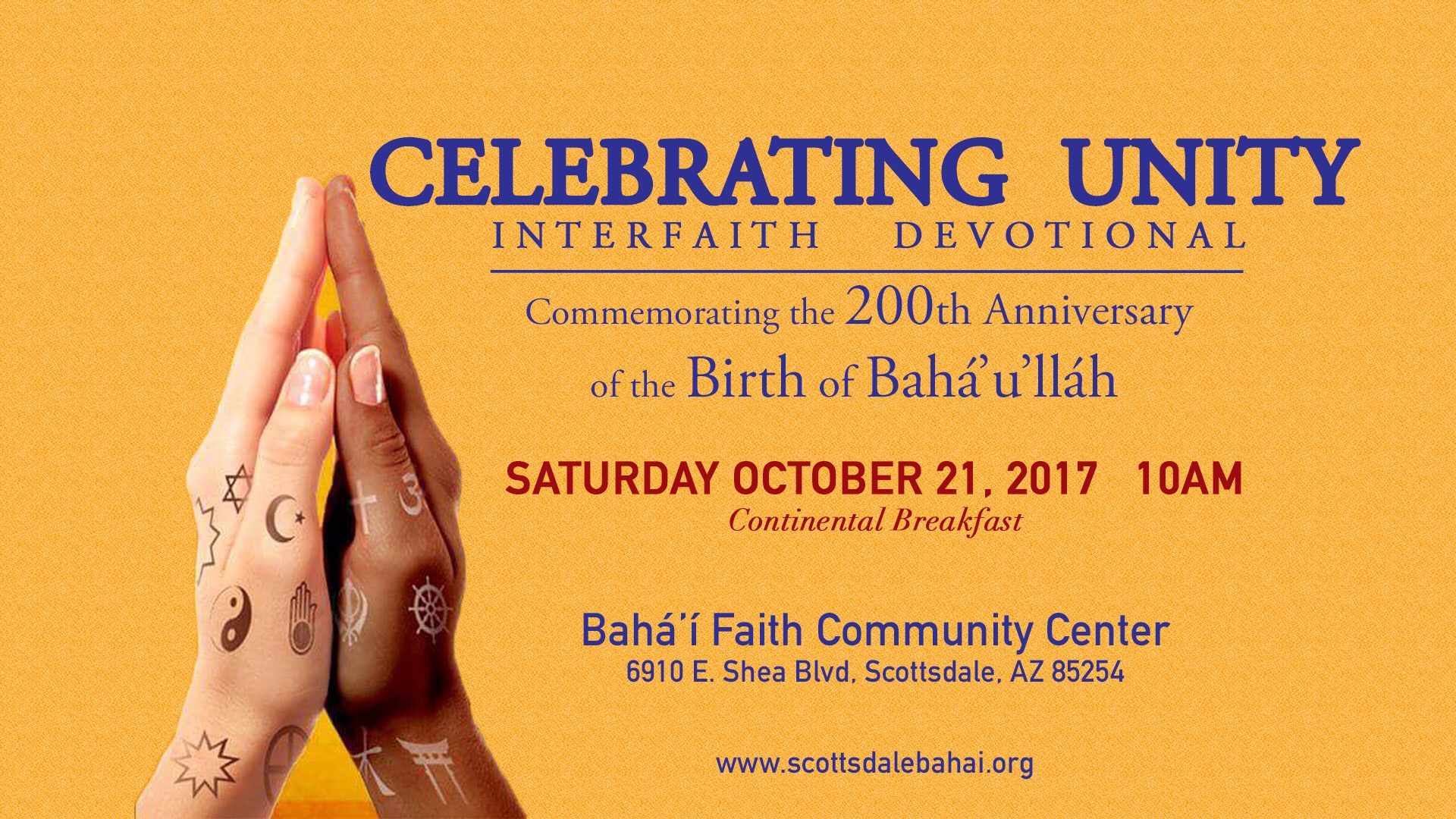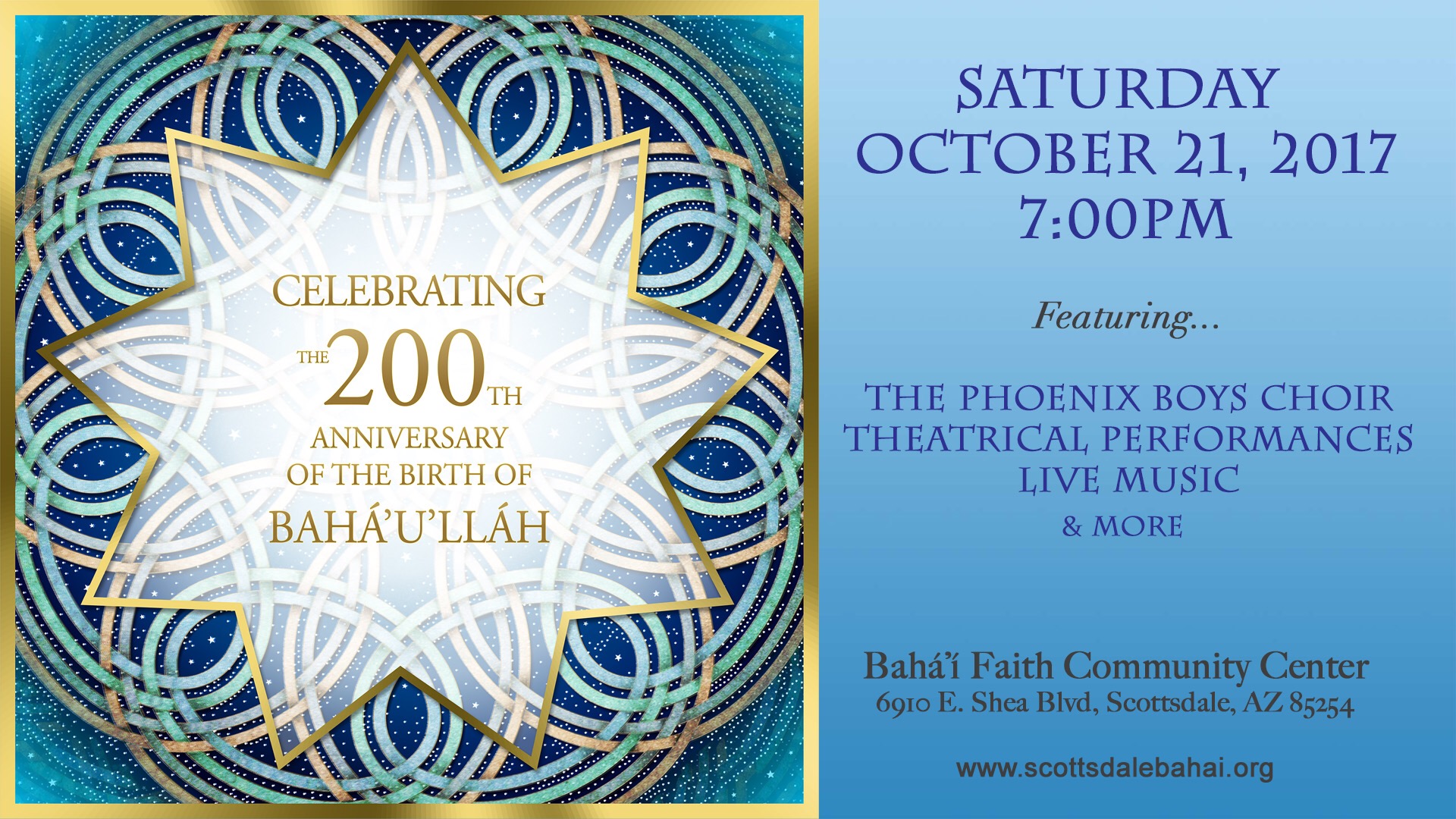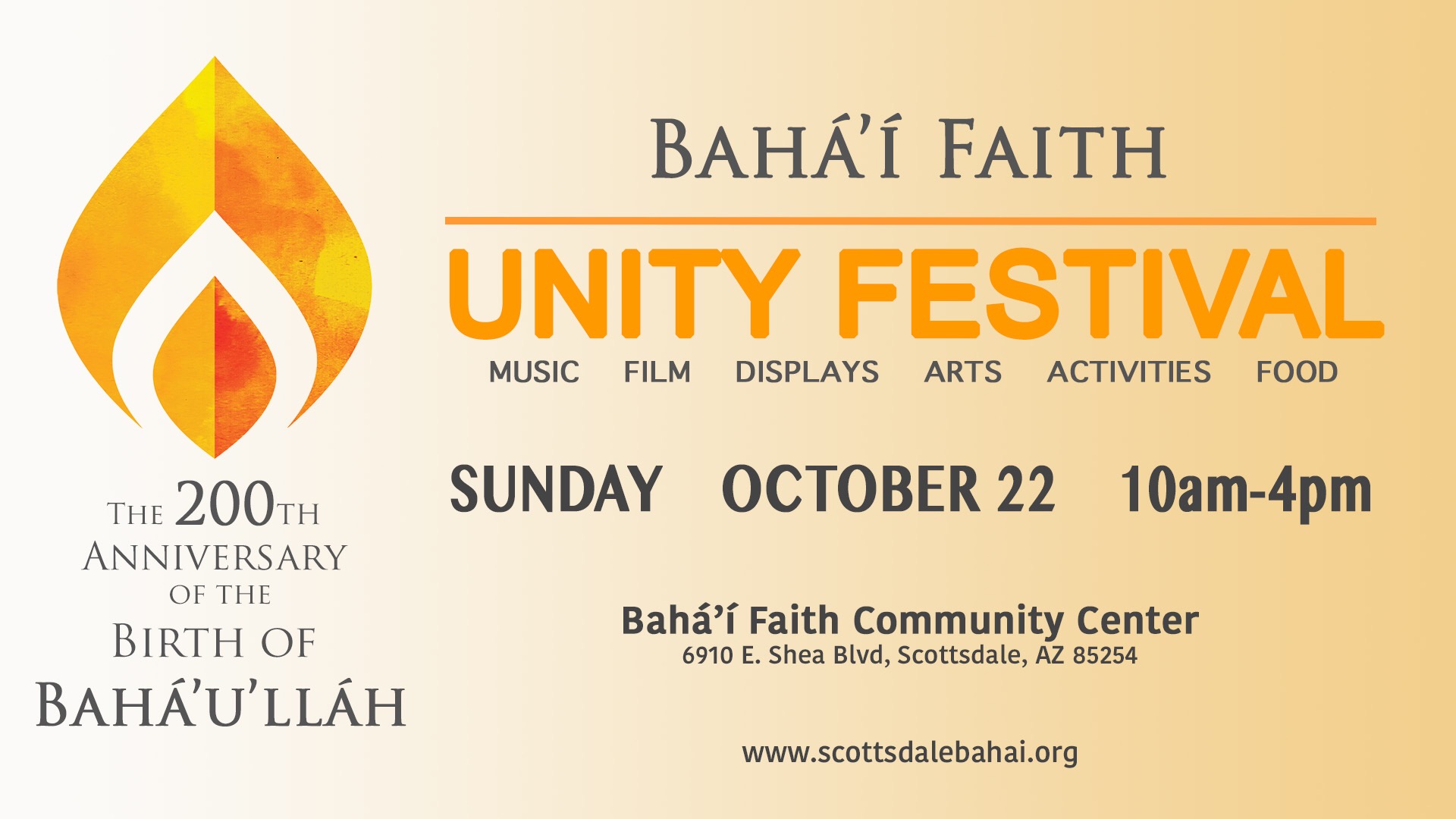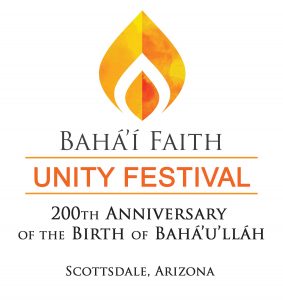The Festivals of the Twin Holy Birthdays refers to two successive holy days in the Bahá’í Calendar that celebrate the Births of two Central Founders of the Bahá’í Faith whom Bahá’ís regard as Manifestations of God, Divine Teachers and Holy Prophets.
The two holy days are the Birth of the Báb (on the first day of Muharram in the Islamic calendar; October 20th 1819 in the Gregorian calendar) and the Birth of Bahá’u’lláh (on the second day of Muharram, two years prior, on November 12th 1817 in the Gregorian calendar). While the Bahá’í Calendar is a Solar calendar of 19 months of 19 days each, these Twin Holy Days are held according to the Lunar calendar in which they occur as the first and second day after the eighth full moon following the Bahá’í New Years.
200th Birth of The Báb
Born in Shiraz, Iran on October 20th 1819, Siyyid `Alí Muhammad was a merchant from a middle-class family. A handsome young man, free of deficiency, impressive in His religious knowledge and striking with the sweetness of His voice, was awaiting an appointed hour when He would reveal His Mission to the world. His Disciples, 18 of them, known as the Letters of The Living, were to find and accept Him independently without each others knowledge.
During one of the most turbulent periods in the world’s history—`Alí Muhammad announced that He was the bearer of a Message destined to transform the life of humanity. At a time when His country, Persia, was undergoing widespread moral breakdown, His Message aroused excitement and hope among all classes, rapidly attracting thousands of followers. He took the name “The Báb”, meaning “the Gate” in Arabic.
With His call for spiritual and moral reformation, and His attention to improving the position of women and the lot of the poor, the Báb’s prescription for spiritual renewal was revolutionary. At the same time, He founded a distinct, independent religion of His own, inspiring His followers to transform their lives and carry out great acts of heroism.
The Báb announced that humanity stood at the threshold of a new era and prepared the way for one whom He said would be greater than Himself titled “Him Whom God Shall Make Manifest”: Bahá’u’lláh.
Bicentenary: Unity Festival 2019
-One of the Twin Holy Days-
Birth of The Báb
(First day after the eighth full moon following the Bahá’í Naw-Rúz; Oscillating Range: from October 14 to November 13)
The day is an observance of the anniversary of the birth on October 20, 1819, in Shiraz, Persia (now Iran), of Siyyid ‘Ali-Muhammad, who later took the title of “the Báb,” meaning “the Gate.” A special year (2019), Bahá’ís observe the 200th year of the Báb’s birth & invite everyone to join in this celebration! The Báb was the herald of the Bahá’í Faith. The day is one of the nine holy days of the year when work is suspended.
October 28th, 7 pm – 9 pm Bahá’í Faith Community Center.
A special commemoration for the Scottsdale Bahá’í community. Light refreshments.
Nov 2nd, Main Event/ Evening Program – Bahá’í Faith Community Center. Open to all.
7 pm – 9 pm; Program will be about 60 minutes, will include dramatic presentations and music followed by refreshments and an opportunity to socialize.
Nov 3rd, Unity Festival/ Daytime – 11 am – 4 pm Bahá’í Faith Community Center. Fun Family activities!
11:00 am – 1:00 pm; Film Documentaries: The Gate and latest video from Bahá’í World Centre to be shown inside the auditorium. Info display booth inside.
1:00 pm – 4:00 pm; Entertainment and lunch: Yellow Birds Dance Group; Greg McAllister & Music, Face Painting, Popcorn, Arts & Crafts, Balloons, Inflated Bouncy, BBQ
200th Birth of Bahá’u’lláh
-One of the Twin Holy Days-
Birth of Bahá’u’lláh (Second day after the eighth full moon following Bahá’í Naw-Rúz; Oscillating Range: from October 15 to November 14): Bahá’ís observe the anniversary of the birth of Bahá’u’lláh (born Mirza Husayn-’Ali) on November 12, 1817, in Tehran, Persia (now Iran). Bahá’u’lláh, which means the “Glory of God,” is the founder of the Bahá’í Faith. A special year (2017), Bahá’ís observed the 200th year of Bahá’u’lláh’s birth & invite everyone to join in this celebration! It is one of the nine holy days of the year when work is suspended.
-The Life of Bahá’u’lláh-
Born in Tehran, Iran on November 12th, 1817, Mirza Husayn-‘Alí enjoyed all the advantages conferred by noble birth. From a very early age, He displayed extraordinary knowledge and wisdom.
As a young man, rather than pursuing a career in government service as His father had done, Mirza Husayn-‘Alí chose to devote His energies to the care of the poor. He showed no interest in seeking position or prominence.
With His acceptance of the religion of the Báb, life permanently changed for the young nobleman and His family. Although They never met in person, from the moment Mirza Husayn-‘Alí heard of the Báb’s message, He declared His wholehearted belief in it and put all of His energy and influence into promoting it.
In 1848, a significant gathering of the Báb’s followers took place in a village in the northeast of Iran named Badasht. Mirza Husayn-‘Alí played a central role in the proceedings, which affirmed the independent character of the new religion. From this time onwards, Mirza Husayn-‘Alí was known as Bahá’u’lláh, meaning the “Glory of God” in Arabic.
As the community of early believers grew, so did the fierce opposition it provoked. Thousands upon thousands were subjected to the most cruel and barbaric treatment, and many were put to death. When three hundred Bábís sought refuge in a deserted shrine called Shaykh Tabarsi, Bahá’u’lláh set out to join them, but He was prevented from reaching His destination.
In 1850, the Báb was publicly executed. With the majority of the Báb’s leading supporters killed, it soon became evident that Bahá’u’lláh was the only One to Whom the remaining Bábís could turn.
Revelation
In 1852, Bahá’u’lláh was falsely charged with complicity in an attempt on the life of Nasiruddin Shah, the King of Iran. When the warrant was issued, He set out to face His accusers, much to the astonishment of those who were charged with arresting Him. They conducted Him, barefoot and in chains, through teeming streets to a notorious subterranean dungeon, known as the “Black Pit.”
The dungeon had once been the reservoir for a public bath. Within its walls, prisoners languished in the cold and unhealthy air, clamped together by an unbearably heavy chain that left its mark on Bahá’u’lláh’s body for the rest of His life.
It was in this grim setting that the rarest and most cherished of events was once again played out: a mortal man, outwardly human in every respect, was chosen by God to bring to humanity a new message.
This experience of Divine Revelation, touched on only indirectly in surviving accounts of the lives of Moses, Christ, and Muhammad, is illustrated in Bahá’u’lláh’s own words:
During the days I lay in the prison of Tihran, though the galling weight of the chains and the stench-filled air allowed Me but little sleep, still in those infrequent moments of slumber I felt as if something flowed from the crown of My head over My breast, even as a mighty torrent that precipitateth itself upon the earth from the summit of a lofty mountain…At such moments My tongue recited what no man could bear to hear.
Exile to Baghdad
After four months of intense suffering, Bahá’u’lláh—now ill and utterly exhausted—was released and exiled forever from His native Iran. He and his family were sent to Baghdad. There, the remaining followers of the Báb increasingly turned to Bahá’u’lláh for moral and spiritual guidance. The nobility of His character, the wisdom of His counsel, the kindness that He showered upon all and the increasing evidences of superhuman greatness in Him, revived the downtrodden community.
Bahá’u’lláh retired to the mountains of Kurdistan, where He remained for two years, reflecting on His divine purpose. This period of His life was reminiscent of Moses’ withdrawal to Mount Sinai, Christ’s days in the wilderness, and Muhammad’s retreat in the Arabian hills.
Yet even in this remote region, Bahá’u’lláh’s fame spread. People heard that a man of extraordinary wisdom and eloquence was to be found there. When such stories reached Baghdad, the Bábís, guessing Bahá’u’lláh’s identity, dispatched a mission to implore Him to return.
Residing once more in Baghdad, Bahá’u’lláh reinvigorated the Báb’s followers; the stature of the community grew and His reputation spread ever further. He composed three of His most renowned works at this time—the Hidden Words, the Seven Valleys and the Book of Certitude (Kitáb-i-Íqán). While Bahá’u’lláh’s writings alluded to His station, it was not yet the time for a public announcement.
As Bahá’u’lláh’s fame spread, the envy and malice of some of the clergy was rekindled. Representations were made to the Shah of Iran to ask the Ottoman Sultan to remove Bahá’u’lláh further from the Iranian border. A second banishment was decreed.
At the end of April 1863, shortly before leaving the environs of Baghdad for Istanbul (known as Constantinople in the English language of the time), Bahá’u’lláh and His companions resided for twelve days in a garden which He named Ridván, meaning “Paradise”. There, on the banks of the River Tigris, Bahá’u’lláh declared Himself to be the One heralded by the Báb—God’s Messenger to the age of humanity’s collective maturity, foretold in all the world’s scriptures.
Further banishments
Three months after departing Baghdad, Bahá’u’lláh and His fellow exiles reached Constantinople. They remained there for just four months before a further banishment took them to Edirne (Adrianople), a gruelling journey undertaken during the coldest of winters. In Adrianople, their accommodation failed to protect them from the bitter temperatures.
Bahá’u’lláh referred to Adrianople as the “remote prison.” Yet despite the inhospitable conditions under which the exiles were forced to live, inspired verses continued to flow from Bahá’u’lláh’s pen, and His message reached as far away as Egypt and India.
Beginning in September 1867, Bahá’u’lláh wrote a letters to the leaders and rulers of various nations. In these prescient writings, He openly proclaimed His station, speaking of the dawn of a new age. But first, He warned, there would be catastrophic upheavals in the world’s political and social order. He summoned the world’s leaders to uphold justice and called upon them to convene an assembly where they would meet and put an end to war. Only by acting collectively, He said, could a lasting peace be established. His warnings fell upon deaf ears.
Continued agitation from Bahá’u’lláh’s detractors caused the Ottoman government to banish Him one final time, to its most notorious penal colony. Arriving in the Mediterranean prison city of ‘Akká on 31 August 1868, Bahá’u’lláh was to spend the rest of His life in the fortified city and its environs.
In ‘Akká, Bahá’u’lláh revealed His most important work, the Kitáb-i-Aqdas (the Most Holy Book), in which He outlined the essential laws and principles of His Faith, and established the foundations for a global administrative order.
Final years
In the late 1870s, Bahá’u’lláh—while still a prisoner—was granted some freedom to move outside of the city’s walls, allowing His followers to meet with Him in relative peace. In April 1890, Professor Edward Granville Browne of Cambridge University met Bahá’u’lláh at the mansion near ‘Akká where He had taken up residence.
Browne wrote of their meeting: “The face of Him on Whom I gazed I can never forget, though I cannot describe it. Those piercing eyes seemed to read one’s very soul; power and authority sat on that ample brow…No need to ask in whose presence I stood, as I bowed myself before one who is the object of a devotion and love which kings might envy and emperors sigh for in vain.”
Bahá’u’lláh passed away on 29 May, 1892.
(based on text found at bahai.org)
Bicentenary: Unity Festival 2017 Recap
Watch Live Stream of Evening Program: https://www.scottsdalebahai.org/live-stream/
SATURDAY OCTOBER 21, 2017
10:00am-12:00pm
Interfaith Devotional
with Continental Breakfast
12:0pm-4:00pm
Open House
7:00pm-10:00pm
EVENING CELEBRATION
with Light Refreshments
***
SUNDAY OCTOBER 22, 2017
10:00am-4:00pm
UNITY FESTIVAL
All Day Festival
Activities for the Whole Family
Celebrate with Us!
Every year, Bahá’ís all over the world celebrate two special occasions, the Births of Bahá’u’lláh (born 1817) and the Báb (born 1819), the two successive Prophets who are the central Figures in the Bahá’í Faith. The years, 2017 and 2019, are particularly special as each of these years marks a 200th year anniversary of the birth of one of these two revered Figures.
Who were these Two celebrated Figures?
The Báb, whose title means “the Gate,” was born Sayyid `Alí-Muhammad in 1819, in Shiraz, Iran. Though the Báb was a Manifestation or Prophet of God, and the Founder of a great religion, He also perceived Himself to be a forerunner of yet another Messenger Who would soon come after Him. Today, Bahá’ís recognize this latter Manifestation to be Bahá’u’lláh.
Bahá’u’lláh whose title means the “Glory of God,” was born Mírzá Husayn `Alí of Núr, Iran in 1817. In 1863, nineteen years after the beginning of the Bábí Faith, Bahá’u’lláh publicly declared His Message. He declared Himself as not only the One promised by the Báb, but one who had come to unify all of humanity.
This year, on Saturday, October 21, the Bahá’ís of Scottsdale will be holding the 200th year anniversary of the Birth of Bahá’u’lláh, the first of two major celebrations for these two Figures (2019 will mark the 200th year anniversary of the Birth of the Báb). These Holy Days mark the happiest and most festive time for Bahá’ís, and the Bahá’í community is delighted to invite our friends, neighbors and acquaintances to come and partake of these celebrations!
FAQ:
Is there a cost to attend?
Admission is free!
Are there minimum age requirements to enter the event?
All ages are welcome to attend! There will be children’s activities, but children should be accompanied by an adult at all times.
Where can I park?
There is sufficient parking in and around the Bahá’í Center.
Will there be food?
Yes, there will be refreshments. Saturday morning there will be a complimentary Continental Breakfast. On Sunday there will be food trucks in the parking-lot available during the festival.

